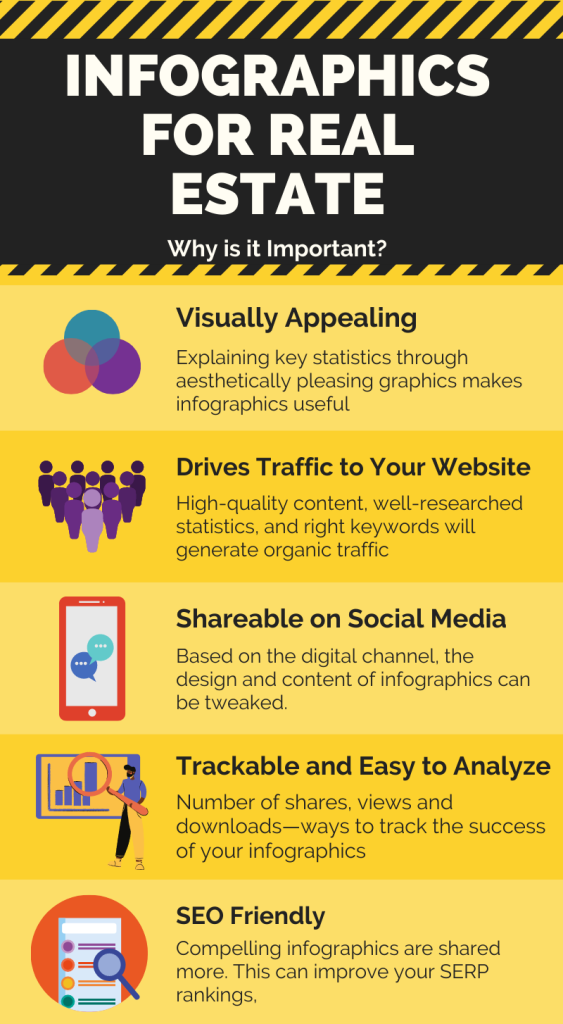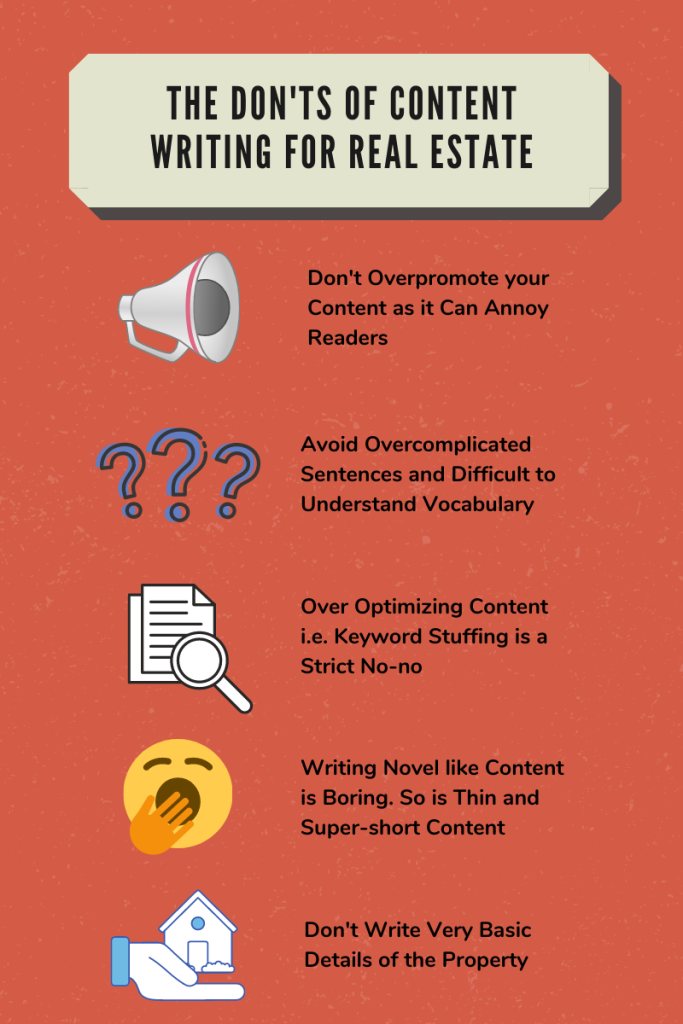
Years ago, finding a real estate agent was slightly taxing. Homebuyers had to connect with an agent through friends, family members, or by flipping through advertisements on Yellow Pages. However, growing internet penetration and the use of various real estate digital marketing techniques have opened a new avenue for buyers and real estate agents.
In addition to this, the advent of social media has changed the way content is shared and consumed. With a single click, homebuyers can find ample information pertaining to listings that you have on offer. They can also gauge through your company’s profile and domain knowledge by reading the content you share on social media platforms.
Hence, with throat-cutting competition and the availability of multiple content sharing platforms, how do you bring your real estate business to the forefront? In this article, we will share some of the best practices in content writing for real estate which will take your business to new heights.
Best Practices in Content Writing for Real Estate
- Website
- Property Listings
- Social Media Posts
- Forums
- Infographics
- Blogs
- Market Reports
- Testimonials
- Newsletters
- FAQs and Fact Sheets
1. Website
Although having a poor website is considered one of the biggest real estate marketing mistakes, yet agents and developers pay less emphasis on it. A functional and user-friendly website acts as a point of contact between homebuyers and sellers. Apart from creating a brand image, professionally designed websites help homebuyers skim through the important details such as project location, highlights, market comparison, and amenities. When it comes to website content writing for real estate, here are some points that you should consider:
- Content should be persuasive, eye-catchy, and appealing.
- Be it the highlights or location advantages, the content should be clear and uncluttered.
- High-quality images should be used to showcase real estate projects.
- Maps, videos, and infographics will accentuate homebuyers’ interest.
2. Property Listings
When we talk about content writing for real estate, property listings is the first thing that strikes our mind. While there are numerous factors that help homebuyers finalize a property, how you write the property description plays a pivotal role in their decision making. The information that you provide should be well-researched, highly detailed, and superbly articulated. Here are some tips that will help you write impeccable property descriptons.
- Be careful with the adjectives and phrases you use. For example, the words “luxurious” and “landscaped” act as a huge selling point for agents. However, terms like “nice” and “cosmetic” can cost you a lot of time and resources.
- Punctuations should neither be used sparingly nor in excess.
- Avoid long sentences as it becomes hard to keep up with the information.
- Skip basic information and highlight the unique features of the property.
3. Social Media Posts
Be it Facebook or Twitter, you can share ample content related to the real estate industry or the services you offer. This includes but is not restricted to new listings, videos, infographics, key takeaways from market research reports, neighbourhood guides, client testimonials, memes, etc. Unlike blogs, where content can be in long- and short-form, real estate posts for social media should be concise, catchy, and informative.
Keep your social media posts consistent and fresh to capture your audience’s attention. Sharing regular updates and engaging content strengthens connections with your followers and highlights your expertise. Don’t forget to respond to comments and messages; building rapport creates a sense of community and trust. Keep your content varied so everyone finds value in what you post.
4. Forums
If you want to network with real estate professionals at almost no cost, then joining forums is the easiest way. From marketing tips and business strategies to investment-related questions, you can post multiple articles on forums. Plus, forums are one of the digital channels that can drive organic traffic to your website.
Communicating through various real estate forums might be an excellent platform to encounter professionals in the industry, gain insights from them, and share your own perspectives as well. With every active participant, you get registered as the one who knows what they are talking about.
It’s vital to give useful information when you post messages in these groups. Share your own achievements, offer solutions to typical problems, and answer queries from others. That shows everyone how skilled you are and helps you gain their trust.
Also, these groups can help bring people to your website if you put links there. People who find your tips interesting might want to know more about your work. This could lead to new customers, growing your mailing list, and increasing your overall real estate business.
Pick out groups where lots of people talk and discuss topics relevant to you. Being part of such groups ensures your ideas reach those who will benefit most from them. It also lets you meet colleagues working toward similar goals.
So, being part of real estate groups is a smart move; it doesn’t cost much but offers many benefits. Sharing helpful information regularly makes you stand out as an expert, helping boost your business.
5. Infographics
If you type “real estate infographics” on Google search engine, you will be surprised to find more than 2 crore search results for the same. This explains the significance of infographics in real estate content marketing. Not only are infographics visually enticing, but they are an excellent way of demonstrating your knowledge of real estate. Search Engine Optimized (SEO) infographics coupled with compelling data will drive organic traffic to your website. The image given below highlights the importance of infographics based content writing for real estate.

6. Blogs
Blogging is one of the most important aspects of content writing for real estate. It offers you the flexibility of describing your services in detail through long- or short-form content. From market trends and homebuying tips to real estate laws and important news pieces, there are an array of topics you can share insights on. However, it is important to keep the target audience and SEO metrics in mind while writing content. Here are some content creation ideas for your real estate website:
- Industry insights, statistics, data, and trends.
- Upcoming or sold projects, property listicles, your services, etc.
- Niche-specific content. For example, if you are experienced in commercial real estate, then your content should focus on it.
- Homebuyers often want information on location, neighbourhood, and the local laws of the region they wish to live in. All the information regarding these aspects can be provided through content.
- Developing “How-to-guides” is yet another way of content writing for real estate. You can cover topics like how to choose a broker or how to sell properties.
7. Market Research Reports
Content writing for real estate is not limited to blogging or creating social media posts, but you can broaden your horizon by publishing market research reports. These reports can either be in downloadable form or can be furnished as whitepapers. The idea is to provide homebuyers a detailed and well-researched guide that can make their home buying or selling process hassle-free.
You can conduct surveys through email campaigns and social media and collate the findings in your reports. Alternatively, you can prepare reports on local attractions, restaurants, schools, daycares, etc. Perhaps, this is also an effective medium for you to showcase your yearly business statistics, the types and number of properties you have sold, or client feedbacks.
8. Client Testimonials
Client testimonials play a pivotal role in building your brand reputation and etching your name in the real estate industry. After a successful deal, you can ask your clients to share their experiences in the form of written testimonials or reviews. You can then share the same on different social media platforms.
In addition to publishing social media posts with client testimonials, you may also use them as strong website features. This is a step that normally helps to build trust with your potential clients and to show that you have the potential to provide real estate services in a professional way.
Providing testimonials for you seems to be as straightforward as it can get, and that’s an important thing to do when you ask for them. Following the closing of a deal, you can send them a follow-up email seeking their feedback and also include the link to a review site or place a form on your website where they can directly give a testimonial.
Another thing you can do is give some sort of reward to those clients who leave you a review, for example, free consultations or anything else they like. This will thus bring more clients into the customer feedback system and, in this manner, show that you value their business.
9. Newsletters
Sending newsletters to your existing and potential customers is an excellent way of building brand awareness, engaging users, and improving conversion rates. Newsletter content writing for real estate, however, varies from what you post on social media. The tone should be persuasive, content must be precise, and email templates should be personalized for different categories.
More importantly, keep your target audience in mind when formulating your newsletter strategy. For example, someone who is looking for a property in Gurugram might be interested in garnering details about location advantages, entertainment places, etc. On the contrary, someone who wants to gain in-depth insight into the real estate industry in India would prefer reading a comprehensive guide on the same.
Accordingly, you can share local market insights, latest blogs, new property listings, real estate news, property finance and tax tips, etc. with your leads.
10. FAQs and Fact Sheets
Let us understand this point through an example. Google “home buying tips” and observe the “People Ask For” section or the searches related to the topic at the bottom of the page. You will notice that a lot of queries hover around the “do’s and don’ts of buying a home” or “how to save money while purchasing a property” for the first time. This should give you a brief overview of the common questions which users have on home buying or selling.
Now when it comes to content writing for real estate, you can use these frequently asked questions as your topics and create amazing content. You can either clear the apprehensions of home buyers through blogs or you can make videos and fact sheets. Being an expert in this domain, you must be familiar with other queries that clients have. You can also create content specifically for answering the other set of questions, thereby diversifying your content sphere.
Note: Video-based content is relevant for almost every industry. But when it comes to residential or commercial real estate marketing, it becomes a necessity as you are dealing with physical spaces. Property and neighbourhood tours, client testimonials, property listings are some of the ways of promoting your brand through videos.
Content Writing for Real Estate: Tips and Tricks
Now that you are familiar with the types and relevance of content writing in real estate, here are a few tips that will aid in improving your content:
- Conduct In-depth Research
As discussed, there are different types of content writing in real estate and each type requires extensive research. The content which lacks information or doesn’t highlight the key features of the properties or services which you offer will not get much traction. Moreover, “thin” content (not much relevance for the user) will not only attract penalties from Google, but it will also increase the bounce rate and reduce conversion rates. Conducting primary as well as secondary research will help you formulate and streamline your content as per the market needs.
- Align Content with Brand Tone
Real estate content should speak a thousand words in just one line. And the tone you follow is how people will connect with your brand. To align your content with the brand tone, you need to understand your target audience, identify your business goals, and have a never-ending zeal for experimentation.
- Optimize Content for SEO and Create Irresistible Headlines
SEO-friendly content writing for real estate is important, but so is optimizing the headings and title for SEO. Using relevant keywords in the content, incorporating headings related to what “People Ask For,” and organizing content for consistency will improve your SERP rankings.
- Segment the Content
Content that is heavy on words may drive away readers and potential customers. For long-form content, divide your content into paragraphs or bullets. You can even incorporate short videos or infographics to make the posts more appealing. However, for social media posts, Google and Facebook Real Estate Ads, simple, catchy, and concise content will attract more readers.
- Proofread
Proofreading is imperative in content writing as even a small error can lead to miscommunication. You need to go through the content line-by-line and look for typographical, grammatical, spelling and syntax errors. Though proofreading is the final leg in the editing cycle, there may be instances where you will need to restructure redundant sentences for brevity, clarity, and flow.
- Post Consistently
Content writing for real estate is not only what you post. It is also about how often and on which platforms you post. Brainstorming ideas regularly, keeping an eye on your competitor’s performance, following a content schedule strictly, and writing great quality content is essential in building your brand identity and to engage with potential clients.
- Leverage the power of storytelling
Utilizing storytelling is a powerful tool to use in writing narratives, which includes client testimonials, transformative property stories and engaging case studies. This approach establishes an organic relationship with your audience and enhances your lead generation strategy, driving engagement and fostering long-term relationships.
Things to Avoid While Writing Content for Real Estate

As easy as it sounds, content writing for real estate requires thorough market research, a well-concocted strategy for driving organic traffic, and regular high-quality content. With so many options to explore, formulating a content marketing strategy may become overwhelming. You can take assistance from real estate marketing and advertising agencies to become the content king of the real estate sector.

![Well, #GrowWithPropacity is here to educate you all about all things Real Estate.
Follow to stay updated in Real Estate!
[Real Estate, Construction, Real Estate Tips, Real Estate Growth, Real Estate Industry, Carpet Area, Super Area, Built Up Area, Home Buying Tips, Home Buyers, Property]](https://propacity.com/blogs/wp-content/plugins/instagram-feed/img/placeholder.png)
Leave a Reply